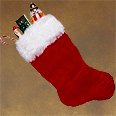
'Commercialization threatens to corrupt both holidays'
Photo: CD Bank
When Sherri Barras, a lifelong Catholic, married David Mintz, an observant Jew, the couple agreed to raise any children they might have in the Jewish faith.
Anticipating the inevitable holiday clash that all interfaith families encounter, Barras tore through every book she could find on the "December dilemma," a reference to the proximity of Christmas and Hanukkah and a metaphor for other struggles faced by Jewish-Christian couples.
But more than 15 years later, as Barras and Mintz prepare to celebrate Christmas and Hanukkah on the same day with their 8-year-old son Sam, the December dilemma, Barras said, is actually "not a big deal."
The three will attend Christmas Eve Mass, and wake up to open presents the next day. That night they will light the hanukkiah.
Immigrants Celebrate
For most Israelis December 25 is nothing more than another work day. But thousands of Christian immigrants from the former Soviet Union celebrate the holiday as they did in the old country – a fact that arouses some ire amongst the religious establishment
"It doesn't feel onerous," Barras says with a shrug. The homemaker keeps a kosher home and a rosary at her bedside.
Just works
She and Mintz, a lobbyist, don't consider themselves the model interfaith family by any stretch, but they make it work. "We're just a family, and this is our circumstance," Mintz says.
Navigating the December holidays sometimes jokingly referred to as Chrismakkah can be difficult for Jewish-Christian families, notes Mitch Sudolsky, director of Jewish Family Service, a mental health and social services agency that is part of the Jewish Community Association of Austin.
"I think some families are concerned that there's going to be pressure on the family… to have this torrent of gift giving, and the kids are going to be spoiled little lunatics at the end of the holiday," he says. "There's pressure on Christians to produce a windfall delivery of presents, and the Jews feel we can't have Hanukkah be inferior."
Christmas and the first night of Hanukkah falling on the same day is unusual, according to Roberta Long. Typically, Hanukkah begins earlier in the month or sometimes in late November. Jews follow a solar-lunar calendar and make adjustments by inserting a leap month every few years to ensure that Passover falls in the spring.
Because commercialization threatens to corrupt both holidays, Sudolsky recommends alternatives such as donating gifts to the needy or performing a mitzvah, or good deed, something many Jewish families do on Christmas or during Hanukkah.
Mitzvah bazaar
Sam Mintz embraced that idea by donating USD 7 of his allowance money to buy a chicken and feed for a family in Kenya through Congregation Beth Israel's mitzvah bazaar. And though his big thing this year is dreidel, not Santa, he happily participates in his mother's Christmas traditions.
"It's just interesting to learn about different religions and to share traditions with other family members," he says.
Jan Soifer, past president of her synagogue, Beth Israel, grew up thinking of Christmas as a secular holiday. It wasn't until she married Pat O'Connell almost 22 years ago and began attending midnight Mass with his family that she appreciated the holiday's spiritual aspects and the common ground that Jews and Catholics share both religiously and culturally.
"I find (with) a lot of interfaith couples one spouse is Jewish and one is Catholic," she says, "because I think there are a lot of commonalities there."
Denise Steinberg won't deny the Jewish-Catholic connection. She and her Jewish husband, Matthew Steinberg, have been married for 22 years and are active in their respective faiths. Denise serves on the liturgy committee at St. Louis Catholic Church, and Matt is involved at Temple Beth Shalom. Often they worship separately, but they attend services together for important Jewish and Christian holidays.
"We just choose to support each other's faith fully," Denise Steinberg says. "We maintain a close friendship with the rabbi and with my pastor and see them socially. It's really been very educational for me."















